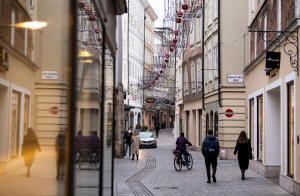Austria enters fourth lockdown as COVID cases soar anew in Europe
 Send a link to a friend
Send a link to a friend
 [November 22, 2021]
By Francois Murphy and Maria Sheahan [November 22, 2021]
By Francois Murphy and Maria Sheahan
VIENNA/BERLIN (Reuters) -Austria entered
its fourth national lockdown on Monday after tens of thousands of
people, many of them far-right supporters, protested in Vienna against
renewed curbs on movement as Europe again becomes the epicentre of the
coronavirus pandemic.
Protests turned to violence in Brussels over the weekend amid
frustration over yet more government controls nearly two years after the
virus was first identified in China.
Austria, introducing the first lockdown in western Europe since vaccines
became available, also announced it would make it compulsory to get
inoculated as of Feb. 1. Many Austrians are sceptical about
vaccinations, a view encouraged by the far-right Freedom Party, the
third biggest in parliament.
Vienna's streets were quieter than usual on a chilly, overcast Monday as
many shops stayed shut, but people went to work, which was still
permitted. The government urged people to work from home where possible.
About 40,000 people protested peacefully in Austria's capital on
Saturday, with only six arrests.

"It's like a luxury prison. It's definitely limited freedom and for me
it's not great psychologically," said Sascha Iamkovyi, a 43-year-old
entrepreneur in the food sector.
"People were promised (by the government) that if they got vaccinated
they would be able to lead a normal life, but now that's not true."
Roughly 66% of Austria's population is fully vaccinated against
COVID-19, one of the lowest rates in western Europe.
Authorities blame mainly the unvaccinated for the current COVID wave,
though experts say vaccine protection appears to wane after some months
and that inoculation, while greatly reducing the risk of serious illness
or death, does not prevent viral transmission or re-infection.
Under Austria's lockdown, restaurants, cafes, bars, theatres,
non-essential shops and hairdressers cannot open their doors for 10
days, and maybe as many as 20.
People can leave home for a limited number of reasons like going to
workplaces or buying essentials. Going for a walk is allowed with no
limit on time or distance.
The Czech Republic and Slovakia banned unvaccinated people from pubs and
services from Monday.
Stock markets kicked off the week on a cautious note after posting a
second consecutive weekly drop, and the euro struggled as traders
weighed the risks of new lockdowns.
[to top of second column]
|

Pedestrians walk at the city centre during the coronavirus disease
(COVID-19) outbreak, as Austria's government imposed a general
lockdown from Monday, in Salzburg, Austria, November 22, 2021.
REUTERS/Lukas Barth

WATER CANNON AND TEAR GAS
Christmas markets in Austria, a huge tourist draw that had only just
begun to open, must also close but, in a last-minute change,
Austrian ski lifts can remain open to the vaccinated.
The conservative-led government imposed a lockdown on the
unvaccinated last week but daily infections kept extending far above
the previous peak, given continued vaccine scepticism as winter
draws in, driving more people indoors.
Riots broke out in cities across the Netherlands as police clashed
with mobs of angry youths who set fires and threw rocks to protest
at COVID-19 restrictions. More than 100 people were arrested during
three nights of violence, which saw police open fire at rioters in
Rotterdam on Friday.
Police and protesters clashed in the streets of Brussels on Sunday,
with officers firing water cannon and tear gas at demonstrators
throwing rocks and smoke bombs, witnesses said.
In many parts of Germany, including its capital Berlin, Christmas
markets opened for the first time in two years on Monday even as the
COVID-19 infection rate reached a fresh record.
But states bordering Austria and the Czech Republic that have by far
Germany's highest case numbers have introduced stricter rules
including cancelling Christmas markets, barring the unvaccinated
from restaurants and bars, and nighttime curfews.
In France, proof of vaccination or a recent negative test is
required to go to restaurants and cinemas and President Emmanuel
Macron said last week more lockdowns were not needed.
But violence erupted last week in the French overseas region of
Guadeloupe amid protests over COVID-19 restrictions such as the
mandatory vaccination of health workers.

Police have arrested at least 38 people and dozens of stores have
been looted. Macron said on Monday the protests had created a "very
explosive" situation.
(Additonal reporting by Jason Hovet and Jan Lopatka; Writing by Nick
MacfieEditing by Mark Heinrich)
[© 2021 Thomson Reuters. All rights
reserved.] Copyright 2021 Reuters. All rights reserved. This material may not be published,
broadcast, rewritten or redistributed.
Thompson Reuters is solely responsible for this content. |